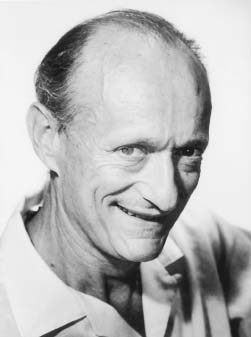Stephen Kuffler facts for kids
Quick facts for kids
Stephen W. Kuffler
|
|
|---|---|
 |
|
| Born | August 24, 1913 |
| Died | October 11, 1980 (aged 67) United States
|
| Nationality | Hungarian American |
| Alma mater | Vienna Medical School |
| Known for | Neurophysiology Neurobiology |
| Awards | Louisa Gross Horwitz Prize (1972) Dickson Prize (1974) Ralph W. Gerard Prize in Neuroscience (1978) Member of National Academy of Sciences Foreign Member of Royal Society |
| Scientific career | |
| Fields | Neurophysiology Neurobiology |
| Institutions | University of Sydney University of Chicago Johns Hopkins University Marine Biological Laboratory at Woods Hole Harvard University Salk Institute |
| Doctoral advisor | John Carew Eccles |
| Doctoral students | David Hubel Torsten Wiesel Eric Kandel John Graham Nicholls Horace Barlow |
Stephen William Kuffler (born August 24, 1913 – died October 11, 1980) was a very important scientist from Hungary and America. He studied how our brains and nerves work. This field is called Neuroscience. Many people call him the "Father of Modern Neuroscience." This means he helped start the way we study the brain today.
Kuffler worked with other famous scientists like Sir John Eccles and Sir Bernard Katz. They gave lectures at the University of Sydney in Australia. Later, in 1966, he started the neurobiology department at Harvard University. He made many big discoveries about how we see, how our nerves send messages, and how our brains control our actions.
Contents
Stephen Kuffler: A Brain Science Pioneer
Stephen Kuffler was a neurophysiologist. This is a scientist who studies how the nervous system works. He was born in Hungary and later became an American citizen. He studied medicine at Vienna Medical School.
Amazing Discoveries About Nerves
Kuffler did important research on how nerves connect to muscles. These connections are called neuromuscular junctions. He studied them in frogs. He also learned about how nerve cells talk to each other. This communication happens at tiny gaps called synapses.
He found out about something called "presynaptic inhibition." This is a way one nerve cell can stop another nerve cell from sending a message. He also studied a special chemical called GABA. GABA is a neurotransmitter, which is a chemical messenger in the brain. It helps to calm down nerve activity.
Building a New Department
In 1966, Stephen Kuffler started the neurobiology department at Harvard University. This was a big step for the study of the brain. He helped create a place where many new discoveries could be made. He also taught and inspired many students who became famous scientists themselves.
Awards and Recognition
Stephen Kuffler was known as a very creative and original scientist. He received many awards and honors from all over the world.
- In 1960, he was chosen to be part of the American Academy of Arts and Sciences.
- In 1964, he joined the National Academy of Sciences.
- In 1971, he became a Foreign Member of the Royal Society in the UK.
- In 1972, he won the Louisa Gross Horwitz Prize from Columbia University.
- In 1978, he became a member of the American Philosophical Society.
His work greatly changed how we understand the brain and nervous system.
Learn More
- Seymour Benzer
- David Hubel
- Eric R. Kandel
- David Rioch
- Gunther Stent
- Torsten Wiesel
- Louisa Gross Horwitz Prize
 | Valerie Thomas |
 | Frederick McKinley Jones |
 | George Edward Alcorn Jr. |
 | Thomas Mensah |

